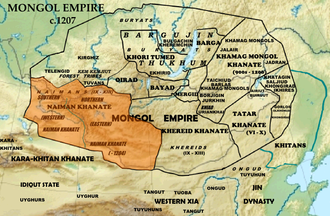ᠨᠠᠶᠢᠮᠠᠨ | |
|---|---|
 Location of the Naiman khanate at the start of the Mongol Empire | |
| Regions with significant populations | |
| [quantify][citation needed] | |
| [quantify][citation needed] | |
| 940.000[4] | |
| Languages | |
| Turkic,[5][6][7] Mongolic[8] | |
| Religion | |
| Tibetan Buddhism (Mongolia) Islam (Kazakhstan, Uzbekistan, Kyrgyzstan) Shamanism Nestorianism (Former)[citation needed] | |
The Naiman (/ˈnaɪmən/; Mongolian: ᠨᠠᠶᠢᠮᠠᠨ [ˈnɛːmɴ̩]; Kazakh and Kyrgyz: Найман [nɑjˈmɑn]), meaning The Eight, were a medieval tribe originating in the territory of modern Western Mongolia[9] (possibly during the time of the Uyghur Khaganate),[10] and are one of the 92 tribes of Uzbeks, modern Mongols[2] and in the middle juz of the Kazakhs.
- ^ Үндэсний Статистикийн Хороо. Найман.
- ^ a b c Очир А. Монгольские этнонимы: вопросы происхождения и этнического состава монгольских народов / д.и.н. Э. П. Бакаева, д.и.н. К. В. Орлова. — Элиста: КИГИ РАН, 2016. — 286 с. — С. 116—119. — ISBN 978-5-903833-93-1.
- ^ D. Kassymova, Z. Kundakbayeva, U. Markus. Historical Dictionary of Kazakhstan. — Scarecrow Press, 2012. — 362 p. — P. 191. — ISBN 978-0-8108-7983-6.
- ^ Казахов посчитали по родам: самые многочисленные — аргыны и дулаты https://365info.kz/2016/08/kazahov-poschitali-po-rodam-samye-mnogochislennye-argyny-i-dulaty
- ^ Man, John (2013). Genghis Khan: Life, Death, and Resurrection. St. Martin's Publishing Group. pp. 19–20. ISBN 978-1-4668-6156-5.
- ^ Rossabi, Morris (2012). The Mongols: A Very Short Introduction. Oxford University Press. p. 46. ISBN 978-0-19-993935-0.
- ^ Mote, Frederick W. (2003). Imperial China 900-1800. Harvard University Press. p. 407. ISBN 978-0-674-01212-7.
- ^ Тодаева Б. Х. (1985). Язык монголов Внутренней Монголии. Очерк диалектов. Москва: Наука. p. 84.
- ^ Бартольд В. В. (1968). Сочинения. Том V. Работы по истории и филологии тюркских и монгольских народов. Москва: Наука. p. 104.
- ^ Кузембайулы А., Абиль Е. А. (2006). История Казахстана. Костанай: Костанайский региональный институт исторических исследований. p. 59. ISBN 978-9965-612-06-0.